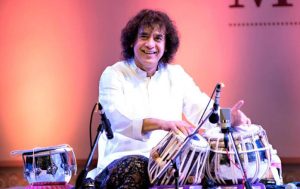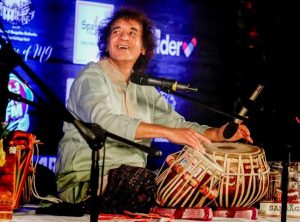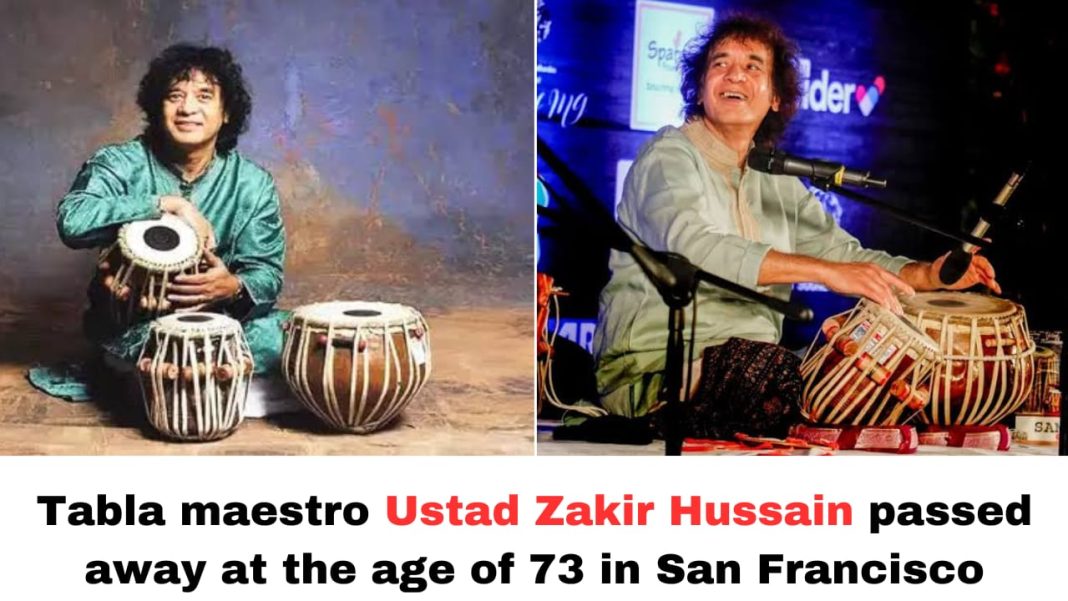Digital News Guru:
Remembering Ustad Zakir Hussain: The Maestro Who Transcended Borders
The music world is mourning the loss of Ustad Zakir Hussain, the legendary tabla virtuoso, who passed away on December 15, 2024, in San Francisco at the age of 73. Known for his unparalleled mastery of the tabla and his ability to bridge Indian classical music with global traditions, Ustad Zakir Hussain’s passing leaves an indelible void in the cultural landscape of both India and the world.
A Musical Prodigy: Early Life and Legacy
Born on March 9, 1951, in Mumbai, Zakir Hussain was destined for greatness. The son of tabla maestro Ustad Allah Rakha, he began his training in Hindustani classical music at an early age under his father’s rigorous tutelage. His innate talent became evident when he started performing in public as a child, and by his teenage years, he had already begun to accompany luminaries of Indian classical music such as Pandit Ravi Shankar and Ustad Ali Akbar Khan.

Zakir Hussain didn’t just inherit his father’s legacy—he expanded it. His prodigious skill and innovative spirit made him one of the most celebrated percussionists of his era. By transforming the tabla from a traditional accompaniment instrument to a globally respected solo medium, he revolutionized the role of percussion in Indian and world music.
An Ambassador of Indian Music
Ustad Zakir Hussain’s contributions to music extend beyond his virtuosity on the tabla. He was an ambassador of Indian music on the global stage. His collaborations with international artists, including guitarist John McLaughlin, violinist L. Shankar, and drummer Mickey Hart of the Grateful Dead, brought Indian classical music to new audiences. As the co-founder of the fusion group Shakti in the 1970s, he pioneered the blending of Indian classical music with jazz and other global traditions, earning accolades worldwide.
His collaborations extended to experimental genres through projects like Tabla Beat Science, where he explored the fusion of traditional rhythms with electronic music. Albums such as Making Music and Planet Drum, the latter of which earned him a Grammy Award, showcased his versatility and innovative approach.
Achievements and Honors
Ustad Zakir Hussain’s contributions to music earned him numerous accolades. In India, he was conferred with the Padma Shri (1988) and the Padma Bhushan (2002), two of the country’s highest civilian honors. Internationally, he received several awards, including the National Heritage Fellowship from the U.S. government in 1999.

As an educator, he served as a visiting professor at institutions like Stanford and Princeton Universities, where he shared his knowledge of Indian classical music and its intricate rhythmic systems. His life’s work was chronicled in the book Zakir Hussain: A Life in Music by Nasreen Munni Kabir, which delved into his journey from a child prodigy to a global icon.
Final Days and Passing
Zakir Hussain had been battling idiopathic pulmonary fibrosis, a chronic and progressive lung disease. Despite his health challenges, he continued to perform and inspire audiences worldwide until recently. His final days were spent in San Francisco, where he passed away surrounded by loved ones. His wife, Antonia Minnecola, a Kathak dancer and his long-time collaborator, and their two daughters, Anisa and Isabella, survive him.
Global Tributes and Mourning
The news of Zakir Hussain’s death has led to an outpouring of grief from music lovers and cultural leaders across the globe. Indian Prime Minister Narendra Modi expressed his condolences, calling Hussain a “cultural treasure” whose contributions to Indian music will inspire generations. Classical musicians, including his peers and younger artists, have shared heartfelt tributes, emphasizing the transformative impact he had on their lives and the world of music.
Fellow tabla players and percussionists hailed him as a guiding light. Taufiq Qureshi, his younger brother and a renowned percussionist, shared an emotional tribute, calling Zakir Hussain “a beacon of excellence and humility.” International artists, from jazz to world music, also expressed their sorrow, highlighting his ability to unite diverse musical traditions.
The Legacy of a Maestro
Ustad Zakir Hussain’s contributions to music go beyond performance. He redefined the role of the tabla, brought Indian classical music to a global stage, and inspired countless musicians across genres. His pioneering efforts in fusion music opened up new avenues for collaboration, making Indian rhythms a universal language.
Through his innovative techniques and profound understanding of rhythm, he set new benchmarks for tabla playing. His performances were a symphony of precision, passion, and spontaneity, captivating audiences worldwide. As an educator, he ensured that his knowledge was passed on to future generations, inspiring a new wave of percussionists who continue to explore the possibilities of Indian rhythm.

Conclusion
The passing of Ustad Zakir Hussain marks the end of an era, but his legacy will endure in the hearts of those he inspired and the music he created. His life was a testament to the power of art to transcend boundaries, foster unity, and enrich humanity.
As the world mourns his loss, it also celebrates the remarkable journey of a maestro whose music will resonate for generations to come. In his own words, “Music is the highest form of communication; it has no barriers.” Ustad Zakir Hussain’s legacy proves that his music, indeed, knows no boundaries.
You May Also Read: Indian chess prodigy D. Gukesh received a hero’s welcome after becoming the youngest World Chess Champion at the age of 18








